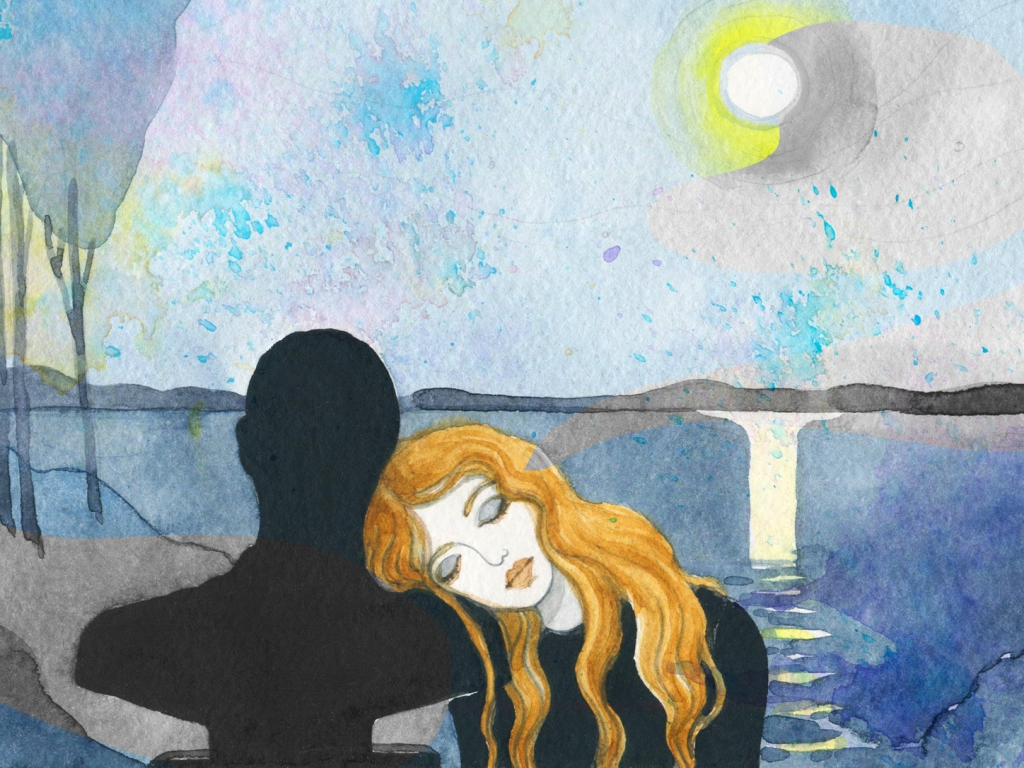Tokyo Weekender’s series TW Creatives feature various works by Japan-based writers, photographers, videographers, illustrators and other creatives in a bid to provide one additional platform for them to exhibit their talent. The works submitted here belong entirely to the creators — Tokyo Weekender only takes pride in being one of their most passionate supporters!
Noise
“Is it true that only a suicide stops a Japanese train from running on time?”
Why did Sophia’s father always ask questions like this? In his last letter he’d wanted to know if she knew anyone who had visited Aokigahara, the so-called Suicide Forest. He said he’d read about it in National Geographic, that you could sense the spirits when you walked through the trees. And did her husband, Paul, know anyone in his office who had died of karoshi – death from overwork?
It was a hot afternoon and the cafe was almost empty. Sophia pushed the letter back into her bag, finished her coffee and looked around. For the first time she was aware of the sun pouring in through the windows and realized the season had changed without her noticing. Most people were outside, feeling the warmth of the summer sun on their skin. She stood up to leave, and the staff called out their thanks in unison: four ringing voices rising above the hiss of the Synesso machine and the background jazz.
‘Arigato gozaimasu!’
She still found it impossible to tune out the everyday clamor of Tokyo: the cuckoo signals at pedestrian crossings, the J-pop and chirpy adverts blaring out from every shop, the cacophonous din of the pachinko parlors, the over-cheerful TV shows with their sherbet-pastel sets. At night, the lights added an extra layer of silent noise; a busy, bright chatter of flashing neon that crowded her mind.
Sophia had been told that even in the villages it was rarely quiet. Her Japanese teacher said muzak and jingles were piped through tannoys in the streets, that the sound carried on the wind to the rice paddies. When she asked why they didn’t complain, Fumiko shrugged and said there was nothing to be done. It was not to be questioned, it was just part of life.
She’d tried to quieten the commotion inside her own head with the hush of museums and books, but inner silence eluded her. She often remembered something her father said when she asked him why he spent so much time in the woods. He told her that solitude was the best companion, that in the wild outdoors it took on a different character, became in itself a connection to the world, an invisible chord between you and your true self.
“I’m alone in the woods,” he’d say, “but I’m never lonely.”
***
When Paul first announced he’d been offered a transfer from London to Tokyo, part of her had held back, wanting to say no. Yet she knew he thought it was time to go, and that the move would be good for them both.
He could no longer face seeing Sophia’s grief, yet she understood that Paul had simply stored away his own, and he’d buried it so deep that there were no longer any surface ripples. She knew the loss of a child wasn’t something to ‘get over’; it wasn’t a hurdle to leap and leave behind. It was a defining line; a line from which everything would be measured from now on: the time before Calum’s death, and the time after Calum’s death. Grief had already become a part of the warp and weft of her, yet at random moments it would rear up unexpectedly with a clatter of hooves, and when it did, the noise was deafening. And unlike the everyday clamor of Tokyo, the noise of grief couldn’t be silenced by earplugs or soundproofing.
***
They’d flown to Tokyo three weeks before Paul started work, and on their second weekend they took a trip to a hot spring resort. After dinner in their room they made love on the tatami floor, a red silk kimono spread out beneath them. It wasn’t urgent or hurried, like the brief couplings they had sought to try and block out death; those violent, bruising encounters that felt like bone on bone. It was slow and considered, and it confirmed, without words, that things could be good again.
On their final evening there was a firework festival in the village. They walked through fields in the fading light, following the lanterns that bobbed ahead of them in a dancing line of turquoise, green and amber. They spread rugs out on the grass, and when the rockets filled the sky with bursts of gold and red, the children breathed a soft collective sigh, and the adults smiled and held their hands. No one noticed Sophia’s tears, and even she herself wasn’t quite sure whether they were being shed for her loss or her happiness.
But this fledgling happiness was short-lived. Paul worked long hours, and rarely took holidays. Sophia was expected to attend dinners with his British and American colleagues, but she was lonely and awkward in their company, out of step, just as she’d been uncomfortable in the London world she’d been pushed into before: Champagne-fuelled celebrations in the boardroom accompanied by mutual backslapping, ‘fun’ nights out at the Sports Bar with unlimited free drinks, Christmas parties at the Cafe Royal. Her mother always told her she would never fit in, that her Yorkshire accent, her inability to conform, would hold her back.
“They’re not your people, darling,” she would say.
And her mother had been right. She’d tried in London, for the sake of her career, but here in Tokyo there was no need. Sophia didn’t want to fit in – didn’t need to fit in – to this new world. She found reasons not to go, until Paul eventually stopped passing on her excuses, and finally she was forgotten.
After a while she no longer felt out of place in Tokyo on her own. She explored the streets and parks and galleries, the temples and the teahouses, and drank coffee in her favorite cafe in Shibuya. As the world strode by the cafe window, Sophia looked on with calm detachment, and when she was tired of looking she wrote everything down in her journal.
She wrote about their neighbor, Mrs. Takahashi, who would knock on Sophia’s door and leave a jar of homemade bean jam or a bag of anpan buns outside on the step. She recounted her walks through the city, and wrote about the man she glimpsed changing his shirt in the doorway at the back of a shop. He revealed a torso that was a riot of fish, flowers, geisha and warriors: the ink badges of a yakuza gangster. He was as colorful as the street fashionistas, but just like the Harajuku girls, his attempt at diversity only reinforced his conformity. And she described the row of shoes – a man’s, a woman’s, and a small girl’s – that she saw lined up inside an open doorway. Sophia imagined the family, laughing and talking over dinner, and the daughter, sleepy-eyed, as her mother kissed her goodnight. More than ever, she felt a dull ache for the different life that she’d lost.
And she wrote of her longing for silence, and of how only suicide prevented a Japanese train from running on time.
She didn’t write about Paul; how he drank every night after work in the hostess bars, and entertained clients in the geisha district. She didn’t mention that she sat on her own in their apartment, waiting for him to come home while she listened to the neighbor’s TV through the thin walls. She didn’t talk about how sad this made her.
And Sophia never wrote about Akiro.
She met him one evening when she was walking through the backstreets in Shinjuku. He was taking a cigarette break, standing in the doorway of his bar, when he saw her peering up the staircase through the tangle of overhead cables. She was wondering which of the tiny bars to venture into, reading the neon signs that flashed above the doors. He bowed, and ushered her upstairs with a sweep of his arm. She ducked her head under a low beam as she went in through the metal door and sat down on the nearest bar stool. She was the only customer. Akiro told her his name, and asked Sophia hers, as he put down a clean beer mat and a hot towel. Then he poured her a beer, and lined up two small dishes of rice crackers. She drank the beer too fast and watched the black and white Kurosawa film that was playing silently on a screen behind Akiro’s head. He looked up at her and smiled, and opened two more bottles of beer. And around ten o’clock, when no one else had come in, he quietly locked the door.
She went back to see him the following week, but there was a Japanese woman with him behind the bar, and he pretended not to know her.
Sophia understood that all the city could offer her was a different sadness, akin to a constant feeling of jet-lag, that left her disoriented and light-headed. She was blinded by Tokyo’s density. There were no panoramic views; only a set of close-ups at point-blank range.
***
And so Sophia began to measure out her life in Japan with a daily routine of coffee shops and art galleries, still trying to quieten the din and clatter inside her head. Yet today, in the cafe, she realized she’d stopped noticing the seasons, the changes in the light; she had stopped observing real life.
And late on that hot afternoon, Sophia took her usual route from the cafe in Shibuya to the train station. But she’d already decided not to go home. Instead, she would take a train to Sumida, to the Skytree tower. She’d eat her dinner there, high above Tokyo, and watch the city lights blink like gimcrack stars as the day faded. It was that time of year when the heavy-limbed heat of the afternoon rolled seamlessly into the evening, and it felt to Sophia as though something intoxicating was waiting just out of reach behind every sliding door. She knew that if she slid back those screens the reality would be a million ordinary Tokyo lives: men and women pouring each other a cold beer, cranking up the air-con, talking about the good things and the bad things at the end of their day.
Yet she was sure that high above the city she would find silence.
She walked to the end of the station platform where it was less crowded, turning abruptly as she heard a commotion behind her. Somehow a baby buggy had fallen between the tracks. Sophia hardly hesitated; she jumped straight down, diving for the baby like a twenty-first-century kamikaze pilot.
And although she wasn’t in a position to notice, she would have been happy to learn that after the train screeched to a halt there was a moment of strange calm and stillness; a silence before the shouts and sirens. And her father would have been interested to hear she’d delayed the 16.56 by thirty-three minutes, and that all the trains on that line had run late for the next hour.
***
Sophia became an instant celebrity. The baby’s parents asked to meet her, and when she declined they sent gifts instead. But Sophia didn’t want thanks or presents, she already had the thing she needed. When she’d handed the child up to the waiting crowd, his dark eyes had met hers, weighing her up in that split second before deciding whether to laugh or cry. In that moment she had seen her own boy, and it was as though she had somehow balanced the scales: a child lost and a child saved.
And one morning, without telling Paul or leaving a note, she packed a bag and took the train to the village they had visited on their second weekend in Japan. She walked up the hill to the temple lodgings, and they agreed that she could take a room for as long as she needed.
On the third evening, Kimiko, the cook, asked Sophia to walk down to the pond with her to watch the fireflies. She told her of the Japanese belief that the tiny lights were the souls of soldiers who had died in battle. She brought her sister’s two children with her, a boy and a girl, and they caught the glowing beetles in glass jars. They held them up for a few moments, captivated, before releasing them again, and as each insect found freedom the children called goodbye in their sweet singsong voices.
Sophia felt as though the lights were the departing soul of her own child, and as she watched them disappear she knew that something within her had shifted.
She slept well that night, yet she was awake again at dawn, because as she’d already discovered, the temple was as full of sound as the city. Outside her room she could hear the dry scrabble of birds’ feet in the guttering, the papery whir and flutter of their tiny brown wings, and the cheeps of fledglings in the nest. When she walked in the fields, she was enveloped in the buzz and rasp and thrum of insects, and the rustle of dry grass. At dusk there were the temple bells, the soft lull of the monks’ chants, and the gentle clink of pots and pans from the kitchen below her window.
And in this new noise, Sophia found her silence.
Author’s Profile

Amanda Huggins is an award-winning travel writer, author and poet. Her debut novella, All Our Squandered Beauty, will be published in January 2021. Amanda grew up on the north-east coast of England, moved to London in the 1990s, and now lives in West Yorkshire. She has made several trips to Japan over the last fifteen years and has a great interest in all aspects of Japanese culture and lifestyle. She is also a voracious reader of Japanese literature in translation and a big fan of Japanese cinema. She worked in engineering for twenty years and is also a creative writing tutor and competition judge. You can pre-order All Our Squandered Beauty from Victorina Press here and Amanda‘s short story collections, Separated From the Sea and Scratched Enamel Heart are available online from Amazon, Waterstones, Barnes & Noble etc. Follow her on Twitter @troutiemcfish
Read more of Huggins’ fiction work here:

Want to be featured next? Write us at [email protected]









